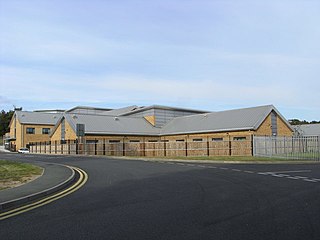Related Research Articles

The Department of Health and Social Care (DHSC) is a department of His Majesty's Government responsible for government policy on health and adult social care matters in England, along with a few elements of the same matters which are not otherwise devolved to the Scottish Government, Welsh Government or Northern Ireland Executive. It oversees the English National Health Service (NHS). The department is led by the Secretary of State for Health and Social Care with three ministers of state and three parliamentary under-secretaries of state.
An NHS trust is an organisational unit within the National Health Services of England and Wales, generally serving either a geographical area or a specialised function. In any particular location there may be several trusts involved in the different aspects of providing healthcare to the local population. As of April 2020 there were altogether 217 trusts, and they employ around 800,000 of the NHS's 1.2 million staff.
Clinical audit is a process that has been defined as a quality improvement process that seeks to improve patient care and outcomes through systematic review of care against explicit criteria and the implementation of change
The Healthcare Commission was a non-departmental public body sponsored by the Department of Health of the United Kingdom. It was set up to promote and drive improvement in the quality of health care and public health in England and Wales. It aimed to achieve this by becoming an authoritative and trusted source of information and by ensuring that this information is used to drive improvement. The Commission was abolished on 31 March 2009 and its responsibilities in England broadly subsumed by the Care Quality Commission.

The Audit Commission was a statutory corporation in the United Kingdom. The commission's primary objective was to appoint auditors to a range of local public bodies in England, set the standards for auditors and oversee their work. The commission closed on 31 March 2015, with its functions being transferred to the voluntary, not-for-profit or private sector.

The General Medical Council (GMC) is a public body that maintains the official register of medical practitioners within the United Kingdom. Its chief responsibility is to "protect, promote and maintain the health and safety of the public" by controlling entry to the register, and suspending or removing members when necessary. It also sets the standards for medical schools in the UK. Membership of the register confers substantial privileges under Part VI of the Medical Act 1983. It is a criminal offence to make a false claim of membership. The GMC is supported by fees paid by its members, and it became a registered charity in 2001.

A mental health trust provides health and social care services for people with mental health disorders in England.

The NHS Confederation, formerly the National Association of Health Authorities and Trusts, is a membership body for organisations that commission and provide National Health Service services founded in 1990. The predecessor organisation was called the National Association of Health Authorities in England and Wales.

NHS Scotland, sometimes styled NHSScotland, is the publicly funded healthcare system in Scotland and one of the four systems that make up the National Health Service in the United Kingdom. It operates 14 territorial NHS boards across Scotland, supported by seven special non-geographic health boards, and Public Health Scotland.
The Health and Social Care Select Committee is a Departmental Select Committee of the British House of Commons, the lower house of the United Kingdom Parliament. Its remit is to examine the policy, administration and expenditure of the Department of Health and Social Care (DHSC) and its associated agencies and public bodies. The Clerks of the Committee are Previn Desai and Joanna Dodd.

The Care Inspectorate is a scrutiny body which supports improvement. They look at the quality of care in Scotland to ensure it meets high standards. Where improvement is needed, they support services to make positive changes. The Care Inspectorate was set up in April 2011 by the Scottish Government as a single regulatory body for social work and social care services, including child protection and the integration of children's services. The new organisation took on work in these areas previously carried out by:

Emergency medical services in the United Kingdom provide emergency care to people with acute illness or injury and are predominantly provided free at the point of use by the four National Health Services (NHS) of England, Scotland, Wales, and Northern Ireland. Emergency care including ambulance and emergency department treatment is only free to UK residents and a charge may be made to those not entitled to free NHS care.

Healthcare in the United Kingdom is a devolved matter, with England, Northern Ireland, Scotland and Wales each having their own systems of publicly funded healthcare, funded by and accountable to separate governments and parliaments, together with smaller private sector and voluntary provision. As a result of each country having different policies and priorities, a variety of differences have developed between these systems since devolution.

The National Health Service (NHS) is the publicly funded healthcare system in England, and one of the four National Health Service systems in the United Kingdom. It is the second largest single-payer healthcare system in the world after the Brazilian Sistema Único de Saúde. Primarily funded by the government from general taxation, and overseen by the Department of Health and Social Care, the NHS provides healthcare to all legal English residents and residents from other regions of the UK, with most services free at the point of use for most people. The NHS also conducts research through the National Institute for Health and Care Research (NIHR).
The Care Quality Commission (CQC) is an executive non-departmental public body of the Department of Health and Social Care of the United Kingdom. It was established in 2009 to regulate and inspect health and social care providers in England.
Healthcare in England is mainly provided by the National Health Service (NHS), a public body that provides healthcare to all permanent residents in England, that is free at the point of use. The body is one of four forming the UK National Health Service as health is a devolved matter; there are differences with the provisions for healthcare elsewhere in the United Kingdom, and in England it is overseen by NHS England. Though the public system dominates healthcare provision in England, private health care and a wide variety of alternative and complementary treatments are available for those willing and able to pay.
Healthcare Improvement Scotland (HIS) is the national healthcare improvement organisation for Scotland. It is a public body which is part of the Scottish National Health Service, created in April 2011.
Out-of-hours services are the arrangements to provide access to healthcare at times when General Practitioner surgeries are closed; in the United Kingdom this is normally between 6.30pm and 8am, at weekends, at Bank Holidays and sometimes if the practice is closed for educational sessions.
Jennifer Dixon, CBE, MBChB, FRCP, FFPH, is the chief executive of the Health Foundation, a large independent charity in the United Kingdom. Her work has been recognised by several national and international bodies for her significant impact in driving national health policy making.
References
- ↑ Official website Archived 2008-09-08 at archive.today
- ↑ Concordat - Full signatories Archived 2006-09-26 at archive.today
- ↑ Concordat - Associate signatories Archived 2006-09-26 at archive.today